Tanigumi-san Kegonji Temple 谷汲山 華厳寺
|
|
|
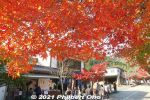
Tanigumi-san (谷汲山 華厳寺) is a Tendai Buddhist temple noted for numerous autumn foliage, especially red maple leaves. Also called Kegonji Temple.It has a nice path to the temple lined with autumn leaves in November.
|
|

This path to the temple is the main highlight lined with lots of maple trees and souvenir shops. When I visited, many of the leaves were still in transition, changing from green to yellow to red. So the gradation or triple colors were really beautifu
|
|
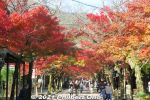
It wasn't exactly a tunnel of maple trees, but it was pretty close. On sunny days, the leaves glow. The temple is quite out of the way, but it was worth coming here.
|
|
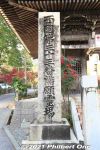
Tanigumi-san is also one of the 33 Saigoku Kannon Pilgrimage temples in western Japan (西国三十三所). It's the last temple (No. 33) on the Saigoku pilgrimage as this stone marker indicates. It's the only one not in western Japan.
|
|
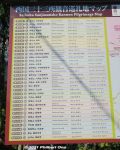
List of the 33 Saigoku Kannon Pilgrimage temples in western Japan (西国三十三所). Tanigumi-san is on the bottom of the list.
|
|
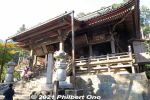
Tanigumi-san (Kegonji) Hondo main worship hall.
|
|

Tanigumi-san (Kegonji) Hondo main worship hall.
|
|
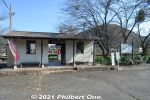
Nearest train station toTanigumi-san is Tanigumiguchi Station on the Tarumi Line. Small little train station with no staff.
|
|
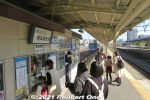
Tarumi Line starts here at JR Ogaki Station on the JR Tokaido Line. You can buy Tarumi Line tickets on the platform when transferring from a JR train.
|
|
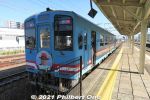
Tarumi Line starts here at JR Ogaki Station. Only one train car on this rural line.
|
|
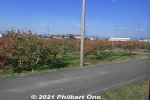
From the train, you see a lot of persimmon groves. This area of Gifu (Mizuho, Motosu, Ibigawa, etc.) is where the fuyu-gaki variety of persimmons (富有柿) originated in the late 19th century.Now grown all over western Japan. Gifu Prefecture is Japan's second largest producer of fuyu-gaki persimmons after Nara Prefecture. If you walk around these neighborhoods, you might see persimmons for sale for cheap in front of a house.
Unfortunately, a few of these farmers are seeing thieves stealing their fruit. They will likely install more security cameras.
|
|
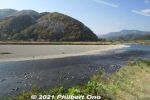
There are some nice views along the train line.
|
|
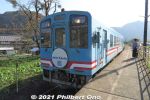
Get off here at Tanigumiguchi Station on the Tarumi Line.
|
|
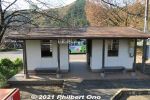
Tanigumiguchi Station, small little train station with no staff.
|
|
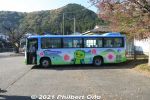
At the station, a shuttle bus (Ibigawa-cho Fureai bus) awaits to take tourists to Tanigumi-san. Short bus ride, but the bus runs only once every 90 minutes until 2:30 pm.
|
|
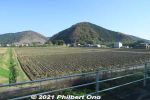
A few nice views from the bus to Tanigumi-san.
|
|

This Somon Gate (総門) marks the start of the path leading to Tanigumi-san. The shuttle bus stop is slightly beyond this gate.
|
|
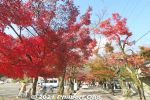
As soon as you get off the shuttle bus and see the path to the temple, you see these maple leaves.
|
|
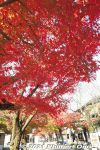
So much autumn eye candy to the temple.
|
|
|
|
|
|
|
|
|
|
|
|
|
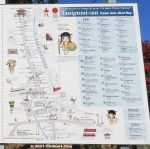
Map of all the gift shops and restaurants along the path to Tanigumi-san.
|
|
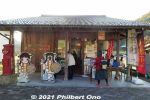
Ibigawa Tourist Information Plaza is also on the temple path. Friendly staff giving local tourist information. 揖斐川町観光プラザ
|
|
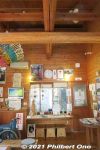
Inside Ibigawa Tourist Information Plaza. 揖斐川町観光プラザ
|
|
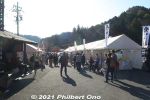
During autumn, a local event selling local food. This is in the parking lot behind the Ibigawa Tourist Information Plaza.
|
|
|
|

Public restroom in a tradtional-style building.
|
|
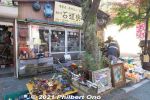
Souvenir shop.
|
|
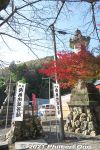
Stone lanterns marking the intersection of the old Tanigumi Kaido to Yokokura.
|
|
|
|
|
|
|
|
|
|
|
|
|
|
|
|
|
|
|
|
|
|
|
|
|
|
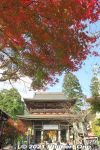
Niomon Gate. Getting closer to the main worship hall.
|
|
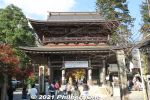
Niomon Gate.
|
|
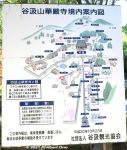
Map of the many buildings at Tanigumi-san.
|
|
|
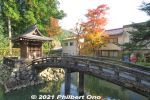
Jizo-do Hall in a pond. 地蔵堂
|
|
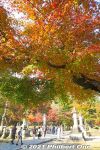
After the Niomon Gate, the path continues along a straight, tree-lined route.
|
|
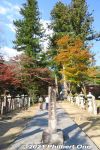
Stone marker for the 33rd and last temple on the Saigoku Kannon Pilgrimage temple in western Japan (西国三十三所).
|
|
|
|
|
|
|
|
|
|
|

Textural tree trunk.
|
|
|
|
|
|
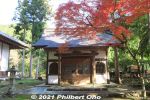
Juodo Hall is a small worhsip hall (closed) on the way to Kegonji. 十王堂
|
|
|
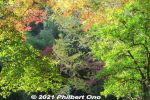
Some greenery too.
|
|

Rakando Hall 羅漢堂
|
|
|
|
|
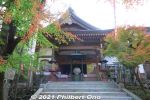
Meioin Temple is where worshippers can receive the temple seal. 明王院
|
|
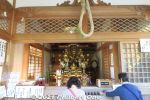
Meioin Temple 明王院
|
|
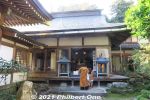
Meioin Temple 明王院
|
|
|
|
|
|
|
|
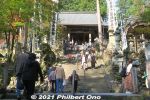
Approaching the Hondo main hall.
|
|
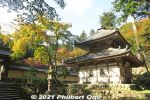
Kyodo Hall near the steps to the Hondo Hall. 経堂
|
|
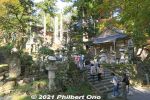
Hall that keeps 33 Kannon statues. Not open to the public. 三十三所堂
|
|
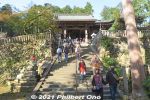
Steps to the Hondo main hall.
|
|
|
|
|
|
|
|
|
|
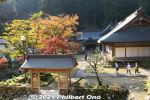
Daishido Temple 大師堂
|
|
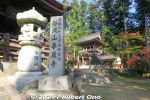
Next to the Hondo Hall is a stone monument/sign for Kegonji Temple.
|
|

At the end of the maple-lined path is Tanigumi-san Kegonji Temple's Hondo main worship hall rebuilt in 1879. (谷汲山 華厳寺)
|
|
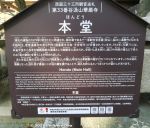
About Tanigumi-san Hondo main hall.
|
|
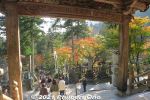
View from the top of the temple steps. Notice on the wooden pillar on the right, there's a koi carp fish hanging on it.
|
|
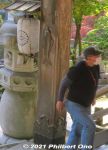
People who completed the 33-temple pilgrimage can rub this fish (made of bronze) to mark the end of their abstinence (精進落ち). The pillar on the left also has a koi fish hanging (not visible).These days, I'm sure most pilgrims do the pilgrimage by car or train. Too far to walk it.
|
|
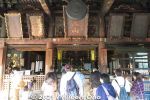
Inside Tanigumi-san Hondo main hall. It worships a hidden 11-faced Kannon statue. The last time the statue was displayed to the public was on March 1–14, 2009.
|
|
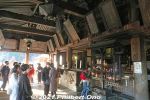
Inside Tanigumi-san Hondo main hall. People pray here for family safety, pregnancy, safe childbirth, business prosperity, transportation safety, passing an exam, recovery from illness, good relationships, and just about everything else.
|
|
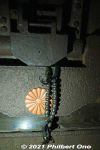
Prayer beads inside the dark, basement passage.
|
|
|
|
|
|
|
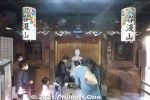
In the back of the temple is a small altar worshipping this Koke-no-mizu Jizo statue (苔の水地蔵尊). People affix these paper prayer labels (¥20) (with water) to heal their ailment on the corresponding part of their body.
|
|
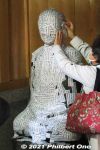
This lady probably wants to cure her impaired hearing. Koke-no-mizu Jizo statue (苔の水地蔵尊)
|
|
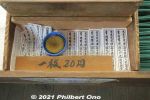
Paper prayer labels (¥20).
|
|
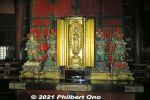
Statues at the back of the main hall.
|
|
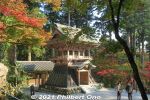
Tanigumi-san bell tower.
|
|
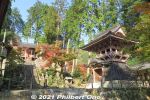
Tanigumi-san bell tower and shrine.
|
|
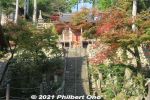
Shinto shrine.
|
|
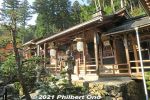
Oizurudo is where pilgrims who completed the 33-temple Saigoku pilgrimage offer their pilgrimage implements. (笈摺堂)
|
|
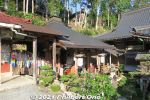
Oizurudo (笈摺堂)
|
|
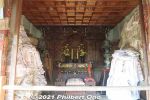
Pilgrims who complete the Saigoku Pilgrimage supposed to visit three buildings at this No. 33 temple. Besides the Hondo main hall, there is this small altar hall called Oizurudo (笈摺堂).
|
|
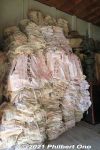
The Oizurudo altar hall is where pilgrims who completed the 33-temple Saigoku pilgrimage offer their pilgrimage implements. You can see walking sticks, Chinaman's hats, and a lot of pilgrims' white oizuru (笈摺) vests (photo) which are like sleeveless happi coats or haori. The pilgrims have it stamped with each temple's vermillion stamp.
|
|
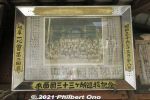
Old group photo of pilgrims who completed the Saigoku Pilgrimage here.
|
|
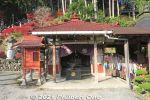
Koyasu-do is a small altar hall to pray for safe childbirth and child raising. 子安堂
|
|
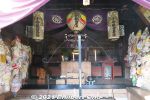
Inside Koyasu-do, a small altar hall to pray for safe childbirth and child raising. 子安堂
|
|
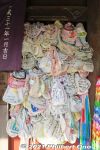
Offerings inside Koyasu-do. 子安堂
|
|
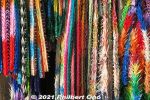
Origami cranes at Koyasu-do and Oizurudo.
|
|
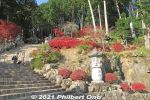
33 stone steps to Mangando Hall (満願堂).
|
|
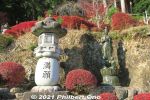
Mangan stone lantern and Kannon statue
|
|
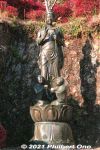
Kannon statue
|
|
|
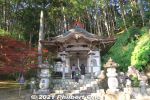
The third building pilgrims must visit here is the Mangando (満願堂) after going up 33 stone steps right behind the main hall. It houses an 11-faced Kannon statue. I saw a few pilgrims chant a sutra here. The interesting feature here is the tanuki stone statues flanking the Mangando on the left and right.
|
|
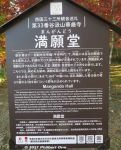
About the Mangando (満願堂).
|
|
|
|
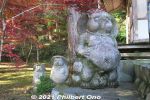
Tanuki is a raccoon dog considered to be an auspicious symbol commonly decorating the entrance to a shop or restaurant.
|
|
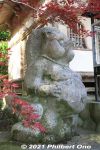
The word "Mangan" means "fulfillment of one's prayer/request" in reference to the completion of the 33-temple pilgrimage. People who complete the pilgrimage are considered to be superior to others. And so the Japanese phrase "ta wo nuku" (他を抜く), meaning "surpassing others," applies to them. Since "ta wo nuku" almost sounds like "tanuki," they have all these tanuki here.
|
|
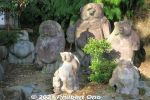
Tanuki
|
|
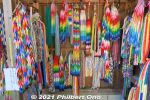
Origami cranes at Mangando.
|
|
|
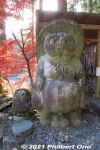
Tanuki statue
|
|
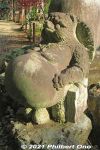
This tanuki near Mangando looks pregnant. But it cannot be pregnant because it's male. Not sure why it has an extra large stomach. No explanation.
|
|
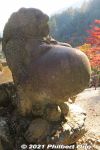
Big belly tanuki.
|
|
|
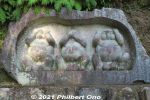
See no evil, speak no evil, and hear no evil by three wise tanuki. Apparently all virile males. Not monkeys, how surprising.
|
|
|
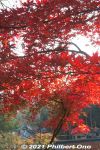
Maples facing the Mangando hall.
|
|
|
|
|
|
|
|
|
|
|
|
|
|
|
|
|
|
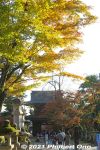
Niomon Gate
|
|

Niomon Gate
|
|
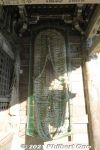
Giant straw sandal on Niomon Gate.
|
|
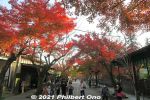
Walking back to the bus stop in late afternoon light.
|
|
|
|
|
|
|
|
|
|
|
|
|
|
|

Manhole in Ibigawa, Gifu.
|
|
|
|
|
|
|
|
|
|
|
|
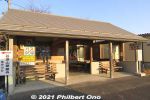
Tanigumi-san bus stop and shelter.
|
|
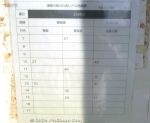
Buses go to Tanigumi-guchi Station (Tarumi Line) or Ibi Station (Ibigawa Line). Very infrequent, so check and remember the return bus schedule when you arrive here.
|
|
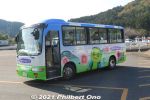
Shuttle bus back to the train station.
|
|

Going to ibi Station.
|
|

Bus ride to Ibi Station.
|
|
|
|

Bus stop at ibi Station.
|
|
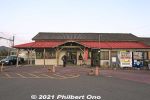
Ibi Station.
|
|

Map of Ibigawa Town.
|
|
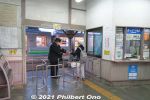
Ibi Station
|
|
|
|

Train for Ogaki at Ibi Station.
|
|

End of Ibigawa Line at Ibi Station.
|
|
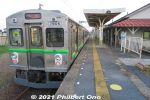
One-car train at Ibi Station.
|
|
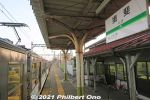
Ibi Station platform.
|
|
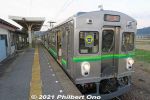
Ibi Station
|
|
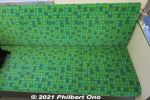
Seats have a gourd design.
|
|

At Kita-Godo Station, these plastic seats look like they are from 1980s shinkansen stations.
|
|
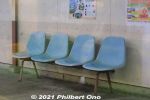
These plastic seats look like they are from 1980s shinkansen stations.
|
|
|
|
|